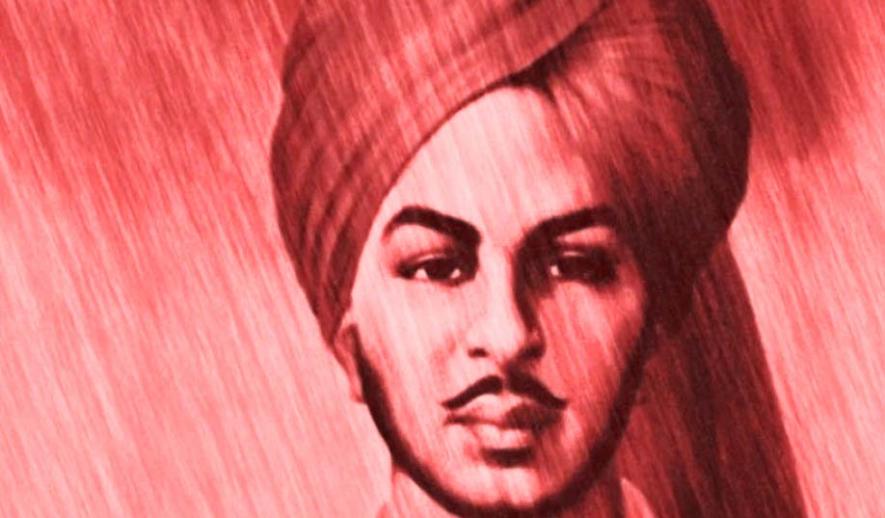The Legacy of Shaheed-e-Azam

On March 23, 1931, amidst the slogans of ‘Down with Imperialism’ and ‘Long Live Revolution’, the three martyrs – Bhagat Singh, Rajguru and Sukhdev – attained revolutionary immortality. The final song on their lips was:
Dil se niklegi na markar bhi watan ki ulfat,
Meri mitti se bhi khushbue watan aaegi.
(Love for the motherland will not leave my heart even after death,
Its fragrance will still be there in my dusty remains.)
We can still feel the fragrance of their ideas and sacrifice in air, which is not limited only to this land, as Bhagat Singh remains the most revered and loved revolutionary in India and Pakistan. Bhagat Singh’s image is an inspiration for the youth and the students. His iconic personality is still inspiring millions. B T Ranadive writes in his foreword to the Selected Writings of Shaheed Bhagat Singh edited by Shiv Verma, “The name of Bhagat Singh and his comrades has secured a permanent place in the minds of the Indian people. No other revolutionary of those days struck such a deep feeling of sympathy, solidarity and oneness among the people. Bhagat Singh and his comrades became part of the people’s consciousness, the symbol of their aspirations and prestige, the symbol of the fight to put an end to enslavement.”
Importance in present context
Bhagat Singh is especially important in the present times when there is an environment of communal hate and violence against minorities, other socially deprived sections (OBCs, SC/STs) and women. Bhagat Singh was against any kind of communal tendencies, and a bitter and uncompromising enemy of communalism in all its forms. He has a special relevance in contemporary India, with the increasing aggressiveness of imperialism bearing down upon the country and the world; with millions of workers, peasants, agricultural labourers and even sections of the middle class becoming prime targets of the rapacious strategy of imperialist globalisation.
Ideology of Bhagat Singh
No one can deny the contribution of Bhagat Singh in the freedom movement and his popularity, especially among youth. Due to this reason, even the forces ideologically opposed to the ideas of Bhagat Singh are trying to appropriate his legacy. He is generally portrayed by them as a hero who believed only in armed struggle. In recent times, the Hindutva brand of nationalism has tried to impose upon him the image of a “brave patriot” who made a selfless sacrifice for the nation and portrayed him in paintings as a pistol holding terrorist. However, care is taken to never discuss his political or religious views, because he was a Marxist and a self-confessed atheist. Bhagat Singh, before his arrest in 1929, had abandoned his belief in terrorism and individual heroic action.
Struggle against Communalism
Secularism was one of the foundations of belief system of Bhagat Singh. This was reflected in his writings. Secularism was, indeed, an article of faith with Bhagat Singh all his life. Bipan Chandra wrote, “More than any other contemporary leader, with the exception of Gandhiji, he understood the danger that communalism posed to Indian society and Indian nationalism. He often warned his comrades and followers that communalism was as big an enemy as colonialism…Religion, said Bhagat Singh, was the private concern of a person, but it had to be fought as an enemy when it intruded into politics and took the form of communalism.” These also became the important principles of the organisations in which he was working.
Question of Social justice
Bhagat Singh and his colleagues were conscious of the need for social justice and demolition of the caste system. In the article titled ‘Achoot Samasya’ (The Untouchability Problem), he denounced the leaders who were strong believers of caste system. He built his argument through the parts of speech of Noor Mohammad in Bombay Council 1926, “If the Hindu society refuses to allow other human beings, fellow creatures so that to attend public school, and if the president of local board representing so many lakhs of people in this house refuses to allow his fellows and brothers the elementary human right of having water to drink, what right have they to ask for more rights from the bureaucracy?”
Uncompromising struggle against imperialism
He launched an uncompromising struggle against imperialism which is equally important in the present scenario when our governments are bending down in front of imperialist forces. They consider imperialism as enemy of humanity. This is reflected in the Statement of the Undefended Accused, drafted by Bhagat Singh “We believe that imperialism is nothing but a vast conspiracy organised with predatory motives. Imperialism is the last stage of development of insidious exploitation of man by man and of nation by nation. The imperialists, with a view to further their piratical designs, not only commit judicial murders through their law courts but also organise general massacres, devastations and other horrible crimes like war.”
Deep understanding of revolution and revolutionary process
In their historic statement before the court on June 6, 1929, Bhagat Singh and B K Dutt, while defending their action of throwing bombs in the Central Assembly, also gave a clear and inspiring account of what they meant by the word revolution. It clearly revealed the growing influence of Marxism. “Revolution does not necessarily involve sanguinary strife, nor is there any place in it for individual vendetta. It is not the cult of the bomb and the pistol. By ‘Revolution’ we mean that the present order of things, which is based on manifest injustice must change.”
In a message sent from the prison in October, 1930, Bhagat Singh said, “We mean by revolution the uprooting of the present social order. For this capture of state power is necessary. The state apparatus is now in the hands of the privileged class. The protection of the interests of the masses, the translation of our ideal into reality, that is, laying the foundation of society in accordance with the principles of Karl Marx, demand our seizure of this apparatus.”
Role of Students and Youth
Bhagat Singh was a strong advocate for participation of youth and students in politics. He took a position against the then national leaders who were preaching students not to participate in politics. At that time few colleges were asking for undertaking from the students declaring that they will not participate in politics. He strongly criticised this, and considered this understanding responsible for the political backwardness of society.
It becomes more important in the present times, when there is a revamped propaganda of depoliticisation of campuses in our country. It is duty of the students and youth of the India to study the ideology of Bhagat Singh and follow the path shown by his ideology and sacrifices. Each one of us should try to follow his path and wage an inward and outward struggle. Inward struggle means the struggle against individualism, heroism, feudal mentality, and outward struggle means carrying forward the organisational, political and ideological struggle. It requires dedication and commitment for this task. In Bhagat Singh’s words, “Crush your individuality first. Shake off the dreams of personal comfort. Then start to work. Inch by inch you shall have to proceed. It needs courage, perseverance and very strong determination. No difficulties and no hardships shall discourage you. No failure and betrayals shall dishearten you. No travails imposed upon you shall snuff out the revolutionary will in you. Through the ordeals of sufferings and sacrifice you shall come out victorious. And these individual victories shall be the valuable assets of the Revolution.”
Also read: "The Wind Shall Carry the Current of My Thoughts..."
Get the latest reports & analysis with people's perspective on Protests, movements & deep analytical videos, discussions of the current affairs in your Telegram app. Subscribe to NewsClick's Telegram channel & get Real-Time updates on stories, as they get published on our website.
























